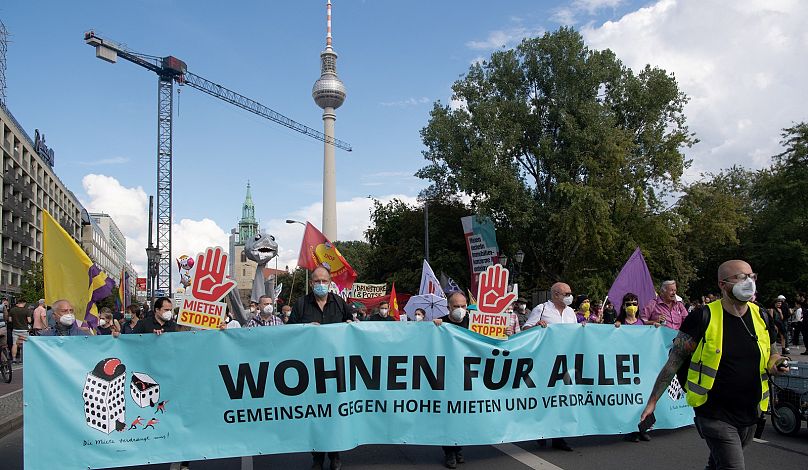Berlin referendum: Could a community land trust be the blueprint to give power back to citizens?
In a city where 80 per cent of its inhabitants rent, how land and property are owned and allocated is an ongoing battle.
In June, after nearly three years of groundwork, Germany established its first community land trust in Berlin - the Stadtboden Stiftung.
 ADVERTISEMENT
ADVERTISEMENT
 ADVERTISEMENT
ADVERTISEMENT
Once deemed one of the most affordable cities in Europe, exploding rents are putting pressure on citizens in a capital city where the income per capita is still below the national average.
On Sunday, Berliners will vote in national elections, which include a referendum to expropriate the city’s largest housing companies and return the city government to the job of being landlord.
With the frustration of increasing property values top of mind, the Stadtboden Stiftung has come right on time.
Following a concept pioneered in the United States and the United Kingdom, land rights are held by a trust while construction and property rights are leased by individuals for a maximum lifetime term of 99 years.
Proponents hope this will keep speculators from buying, holding, and re-selling property as land values increase.
Co-operatives and grassroots
One of the first popular promoters of the land trust concept was Bernie Sanders. When he was mayor of Burlington, Vermont in the 1980s, he helped fund the city’s land trust, which acquired property by helping low-income residents buy their houses.
The trust set limits on how much owners could profit when selling their house by maintaining the ownership of the land itself. That makes the house more affordable to buy in the present, and every time it changes hands in the future.
In Berlin, where more than 80 per cent of residents are renters, the Stadtboden Stiftung modified the community land trust idea to allow co-operatives, alternative housing developers, and grassroots community organisations to take up leases on trust-owned land.
The organisation, which has been in development since 2018, spent three years negotiating government funding, as well as soliciting private donations and land grants.
By permanently removing land from the property market, it will be available for lower-income, grassroots organisations that want to provide housing and social services but can’t afford market rates for them.
Legislating affordability
There are hopes that a land trust will increase affordable housing in a city that faces a deep housing shortage, spurred by the city’s rapid growth of 20,000 to 60,000 people per year.
A spate of public property sales in the early 2000s depleted the supply of social housing, and restrictive rental policies have made the city an unwelcome place for private landlords.
In short: there is less and less housing stock on the market for a rapidly increasing population.
Berlin's state government has aimed to address this through regulations, like their 2015 "Rental Price Brake" law, that held new rental contracts to a threshold not more than 10 per cent higher than the current neighborhood average.
While some landlords simply ignored that limit, others became obsessed with meeting the special circumstances that allowed them to overstep it, for instance making basic renovations to the property.
None of that was enough to stop the steep incline in rental prices - which increased by 46 per cent in the past five years - so the city government implemented a rent cap in early 2020.
That law put a full stop to rent increases for five years, freezing them at 2019 rates. Tenants rejoiced until March 2021, when a German court overturned the law, deeming it unconstitutional and putting renters in debt overnight, with many owing back payments to their landlords.
The next chapter in this saga of renters versus landlords, during the German elections on 26 September 26, a referendum on the ballot will seek to expropriate rental properties from large landlords - 12 companies that each own more than 3,000 rental units .
Common property instead of vacancy
Advocates claim these private companies have been driving steep rent increases, and wish to see that housing stock returned to the Berlin government to administer, citing Article 14 of the German constitution, which says that "property entails obligations. Its use shall also serve the public good".
If the referendum passes, taxpayers would have to pay between €7 billion and €36 billion to buy the properties from their current owners in order to make this social housing dream into a reality.
The Stadtboden Stiftung, meanwhile, is targeting a different culprit of housing instability: empty buildings.
Real estate firm Guthmann reports that the market value of existing rental real estate has increased by 197 per cent in the past 10 years, meanwhile, the housing stock shortage has almost tripled since 2013.
Part of this is due to speculators, who leave their buildings vacant until they can turn a profit by selling again.
In its first public initiative, the Stadtboden Stiftung has targeted 12 vacant buildings - one in each of Berlin’s districts - to start a conversation about using property for the public good. They hope to buy at least one of these properties by the end of the year, taking that land off the speculative market for good.
'Solidarity-based urban development'
But can this land trust model succeed? In 2015, a collection of advocacy groups occupied the Haus der Statistik, East Germany’s bureaucratic headquarters for statistics, which was left vacant after Germany’s reunification.
The resulting collective enterprise gained leasing rights from the city to turn the complex into a multi-use space with long-term social housing, short-term refugee housing, and small-business commercial space in the central district of Mitte.
Community-led initiatives like this have been central to the city’s effort to maintain affordable housing, with co-ops, communal-owned buildings, and even (still) the occasional squat accounting for 28 per cent of rental property ownership in Berlin.
Harnessing the energy of this sector and crippling a system that forces local stakeholders out of the market, the Stadtboden Stiftung hopes that its land trust will create "solidarity-based urban development" in the city.
When it comes to the future of housing, one thing seems certain: the Stadtboden Stiftung will have no shortage of potential tenants.



















